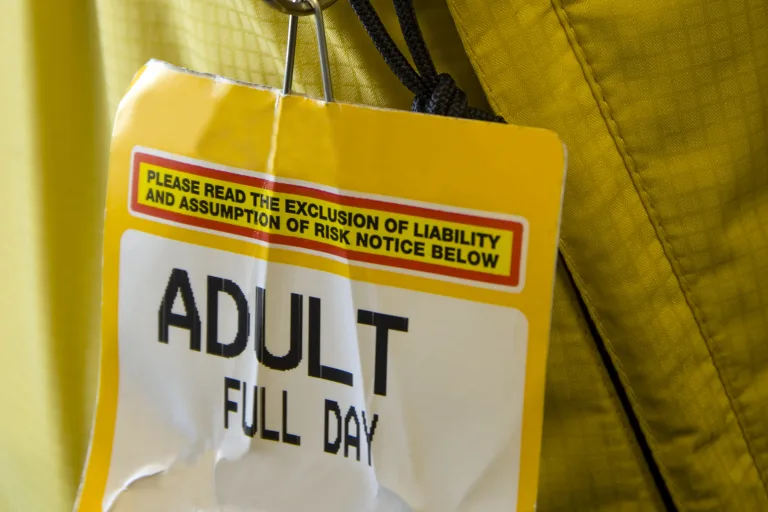Liability waivers

Renting skis, climbing a rock wall, skydiving — if there’s danger involved, the business will probably ask you to sign something beforehand. These liability waivers can impact your rights, often preventing you from getting compensation if you get hurt.
What you should know
“You assume all risks, even if arising from our negligence.”
You may have encountered language like this on a sign or release form as you gear up for some activity. It’s a way for service providers to try to limit their legal responsibility. The statement is often called a liability waiver or release, with language like:
“I agree to waive any claims that I may have against the service provider from any and all liability for any loss, damage, expense or injury, including death, that I may suffer as a result of my participation in the activities, due to any cause whatsoever, including negligence on the service provider’s part.”
These waivers are everywhere. At ski hills. In parking lots. In your yoga studio membership contract. Savvy businesses will use this tactic to try to limit their liability as much as they can.
There’s an implied promise that a service provider will take care of your safety. They have to use “reasonable care” when dealing with you. “Reasonable” means what a reasonable service provider would do in similar circumstances.
With a liability waiver, a service provider asks you to give up that right. By signing the waiver, or even just taking part in the activity, you agree to give up your legal right to sue the provider if you suffer harm, even if the injury results from their failure to take reasonable care.
Some activities require you to sign or initial a waiver before you participate, often in the form of a short document. But not always. When you go skiing, for example, you might feel like you’re just buying a lift ticket. But you’re also agreeing to the terms and conditions of the ski hill, which would typically include a liability waiver.
When you sign an agreement, you’re bound by it whether you’ve read it or not. Similarly with a liability waiver, it doesn’t matter if you didn’t read it or didn’t know its contents. So long as you sign or initial a valid waiver, or agree to the service provider’s terms and conditions that include waiver language, you can be bound by it.
Liability waivers are legal, so long as the service provider follows certain rules. For a waiver to be valid:
the provider must take reasonable steps to bring it to your attention before the contract is made,
the provider must “bring home” your understanding of the waiver, and
the waiver must be clearly stated.
The provider must take steps to bring the waiver to your attention
For example, a ski resort can’t rely on a waiver posted on a sign at the top of the ski hill. You won’t even see the waiver until after you’ve bought your lift ticket.
However, if the waiver is on the ticket and brought to your attention when you buy your ticket, the resort may be able to rely on it.
The provider must “bring home” your understanding of the waiver
The service provider must draw the waiver to your attention, or explain its legal effect to you. This is often called “bringing home” the message. It might be done by:
having you initial the waiver clause in a contract,
placing the waiver clause in large bold print, or
explaining the legal effect of the waiver to you.
The waiver must be clearly stated
A waiver that’s clear and easy to read is more likely to be enforceable. A waiver is less likely to be valid if it:
uses a lot of legal terminology,
has long sentences, and
contains repetitive language.
A valid waiver has limits
Even if the service provider does everything right here, waivers are not unlimited. If the service provider is highly reckless, or intentionally causes you harm, a waiver isn’t valid. And the waiver can’t cover off activities that are unrelated to what you’re doing (for example, a rockslide that hits your car while parked at the skydiving venue would probably not be covered by a waiver signed for the skydiving activity).
The People's Law School website goes more in-depth on liability waivers, including steps to take to protect your rights.
Who can help

Access Pro Bono's Legal Advice Clinics
Volunteer lawyers provide 30 minutes of free legal advice to people with low or modest income.

Access Pro Bono’s Everyone Legal Clinic
Clinicians provide affordable fixed-fee services on a range of everyday legal problems.

BC Legal Referral Service
Helps you connect with a lawyer, notary or paralegal for a free 15- to 30-minute consult to see if you want to hire them.

BC Legal Directory
Search for a lawyer by community, area of law, or language spoken. From the Canadian Bar Association, BC Branch.
This information from People’s Law School explains in a general way the law that applies in British Columbia, Canada. The information is not intended as legal advice. See our disclaimer.

